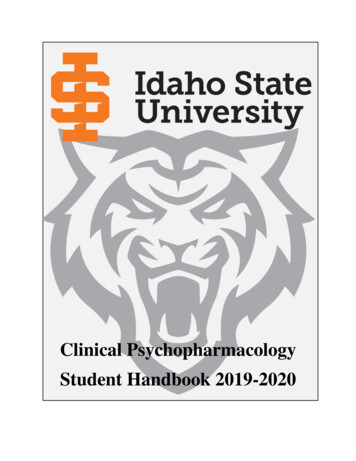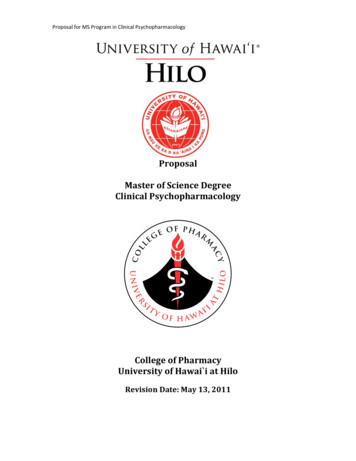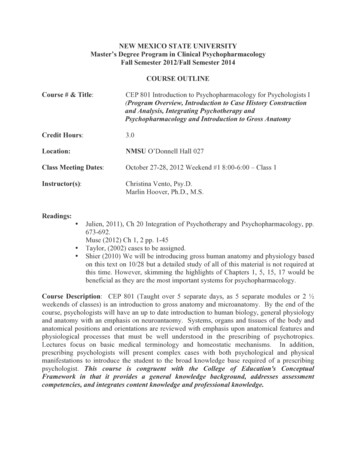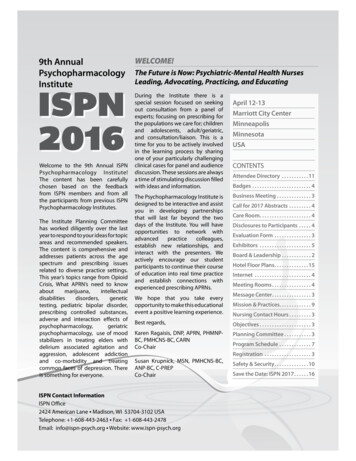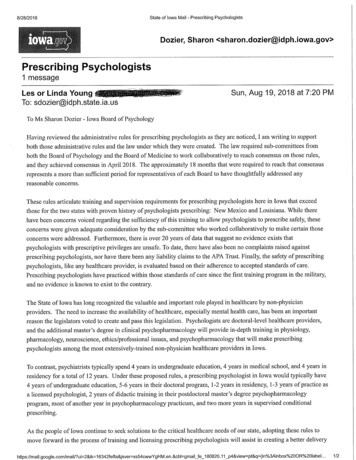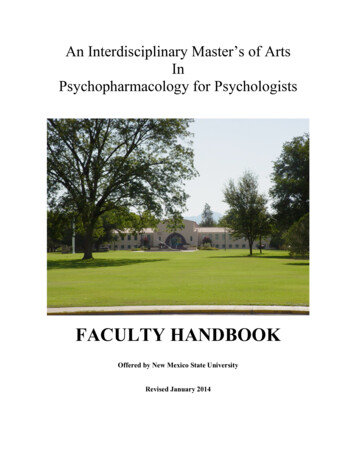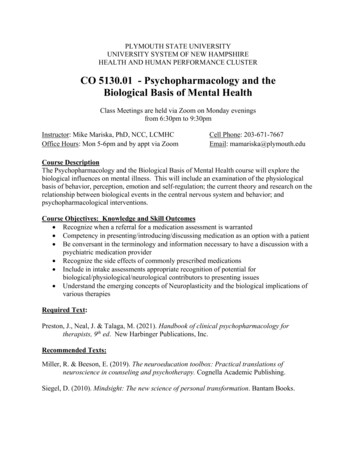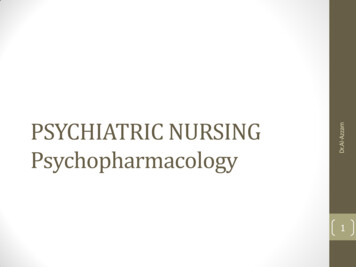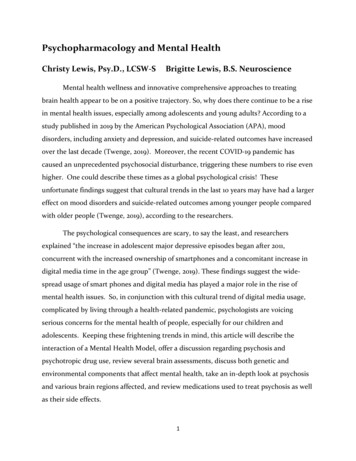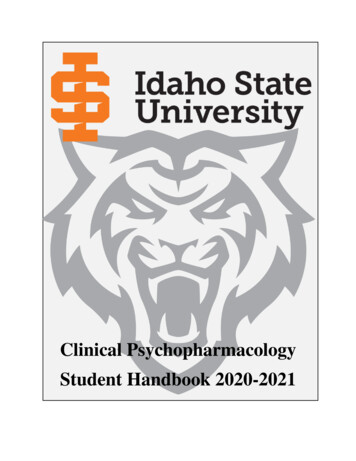
Transcription
Clinical PsychopharmacologyStudent Handbook 2020-2021
This Student Handbook is intended to offer a framework of the intended learning environment providedby the Clinical Psychopharmacology program faculty and staff in the ISU College of Pharmacy. It is alsoprovided to inform students of their rights as well as their obligations and responsibilities. Students areresponsible for knowing the information, policies, and procedures outlined in this document. TheCollege reserves the right to update and change the Student Handbook as necessary. Once the changesare posted online, they are in effect. Students are encouraged to check the online version of the StudentHandbook for the updated versions of all policies and procedures.Questions or suggestions for improving the Student Handbook may be addressed to the ClinicalPsychopharmacology Program Director or the College of Pharmacy Office of Student Affairs.Pocatello Site Contact InformationCollege of Pharmacy970 S 5th AveStop 8288Pocatello, ID 83209-8288Dean’s Office (208) 282-2175Student Affairs (208) 282-3475Meridian Site Contact InformationCollege of Pharmacy1311 E Central DriveMeridian, ID 83642-7991Program Director’s Office (208) 373-1802Office (208) 373-1793
Table of ContentsProgram Overview . 5Welcome from the Program Director . 6Faculty and Staff . 7About the ISU Clinical Psychopharmacology Program . 10Designation Status . 11Licensure . 11Vision, Mission, and Values. 12Vision. 12Mission . 12Values . 12Curricular Philosophy Statement . 12Statement on Interprofessional Education . 12Financial Information . 13Cost of Attendance . 13ISU’s Refund Policy. 14Financial Aid . 14WICHE Funding . 14Scholarships . 15Need-based awards . 15Non-resident tuition waivers (NRTWs) . 15Outside Scholarship Opportunities . 16Curriculum. 16Curriculum Overview . 16Course Requirements. 19Supervised Clinical Experiences . 19Assessment . 20Transfer from Other Schools of Psychopharmacology Programs . 20APA Designation Prescribing Psychology Fellowship . 21Idaho Supervised Provisional Prescriptive Authority. 22Qualifications to Prescribe for Pediatric or Geriatric Patients . 24Credit Toward Certification. Error! Bookmark not defined.Hours of Supervision . 24
Number of Patients . 24Amount of Supervisory Contact . 25Domains for Supervision . 25Formulary (Rule 730) . 25Prohibited Medications and Controlled Substances. 25Disorders and Conditions . 26Policies and Procedures . 26Due Process and Grievance Procedures . 26Professional Technical Standards . 26Progression Policy . 27Academic Status . 27Remediation Plans . 29Dismissal Policy . 29Due Process and Right to Appeal . 30Voluntary Withdrawal/Leaves of Absence . Error! Bookmark not defined.Professionalism Policy. 30Misconduct . 32Grading Policy . 33Equal Opportunity . 33Disabilities Services . 33Advising . 34Record Keeping . Error! Bookmark not defined.Professional Organizations . 35APA Code of Ethics . Error! Bookmark not defined.Confidentiality Understanding . 35
Program OverviewThe Master of Science in Clinical Psychopharmacology program welcomed the inaugural class inthe 2019-2020 academic year at Idaho State University-Meridian.Planning for the program started in 2017 after the Idaho legislature passed a bill authorizingclinical psychologists with appropriate specialized training and licensure to prescribe limitedmedications for the treatment of mental health disorders. This makes Idaho the fifth state inthe country to allow prescriptive authority for psychologists.Located at Idaho State University-Meridian Sam and Aline Skaggs Health Science Center, thetwo-year program combines traditional classroom coursework with supervised clinicalexperience. Students must be licensed psychologists who have earned a doctoral degree inpsychology from an accredited program and institution.The Clinical Psychopharmacology program is housed within the College of Pharmacy. TheCollege of Pharmacy has a long history at ISU. The program was first developed in 1918 byEugene O. Leonard at what was at the time called the Idaho Technical Institute, now IdahoState University in Pocatello. The College of Pharmacy expanded to the Meridian campus in2009. The College of Pharmacy again expanded in 2016 with a campus at the University ofAlaska Anchorage.
Welcome from the Program DirectorI would like to personally welcome you to the College of Pharmacy and to theClinical Psychopharmacology program at Idaho State University. You areembarking on this new educational path at a very exciting time. Becoming the5th state to allow prescription privileges for psychologists, Idaho is expanding therole psychologists play in healthcare. Our program at ISU hopes to play a criticalrole in increasing access to mental healthcare in Idaho and beyond.Healthcare is changing. Integrated care is the future. We have a vision for therole psychologists will play in shaping those changes for the future. The ClinicalPsychopharmacology program will provide a unique training opportunity forpsychologists to develop the necessary knowledge and skills to safely andeffectively utilize medication in treating psychological disorders.Located at Idaho State University-Meridian Sam and Aline Skaggs Health Science Center, the two-yearprogram combines traditional classroom coursework with supervised clinical experience during thesummer semesters. We believe in the format of a traditional bricks and mortar program allowing you totake classes in person. The ISU-Meridian campus houses the Treasure Valley Anatomy and PhysiologyLaboratories. Students will have opportunities to take courses utilizing this state-of-the-art complex oflaboratories. Professors in this program are from interdisciplinary backgrounds, including faculty frompharmacy, neuroscience, nursing, and medical backgrounds.Our motto in the College of Pharmacy is preparing leaders in pharmacy. I am excited about this newopportunity to do the same in a new field by preparing leaders in psychology. You are the future ofpsychology. We are here to help you become the future leaders in your field in any way we can.Our goal in the Clinical Psychopharmacology program is to prepare you for your future career.Eric Silk, Ph.D., M.S.C.P.Clinical Psychopharmacology Program DirectorAssociate Clinical Professor
FacultyMark C. AustinProfessor in the Clinical Psychopharmacology Program(208) 282-3534austinm@isu.eduDr. Austin’s research has focused on the molecular neurochemistry of theserotonin system in major depressive disorder. During his career, it becameevident that major depression is a very heterogeneous disorder that isassociated with a high rate of other serious medical comorbidities such ascardiovascular disease, stroke, dementia, diabetes, obesity, and repetitiveconcussion syndrome. Dr. Austin has begun to develop a broader researchprogram that has expanded and evolved into investigating epigenetic,developmental, cytoskeletal and signal transduction mechanisms underlying depression, chronic stress,obesity, and repetitive traumatic brain injury. His research projects involve a multi-disciplinary approachthat encompasses neuroanatomy, neurochemistry, neuropharmacology, biochemistry, and molecularbiology disciplines and utilizes a variety biochemical and molecular biological techniques as well as invitro cell culture and in vivo small rodent models.Dr. Austin is a graduate of Pennsylvania State University. He earned a Ph.D. in Pharmacology fromWashington State University. He completed a postdoctoral fellowship in molecular and behavioralneuroscience at the National Institute of Mental Health in Bethesda, MD.Gustavo Gonzalez-CuevasAssociate Professor in the Clinical Psychopharmacology ProgramDr. Gonzalez-Cuevas is a behavioral neuroscientist. His research interests arediverse and span from the role of the cannabinoid system in addiction to theassessment of clinical competencies in health science students. Of note, Dr.Gonzalez –Cuevas was a Fulbright Post-Doctoral Fellow in the Molecular andIntegrative Neurosciences Department (M.I.N.D.) at The Scripps ResearchInstitute in La Jolla, CA.Dr. Gonzalez-Cuevas completed his B.S. degree in Cognitive Science, M.S. inPsychobiology, and Ph.D. degree in Neuroscience at the ComplutenseUniversity of Madrid.
Noah HarperAssociate Laboratory Manager, Bioskills Lab Supervisor208-373-1828harpnoah@isu.eduNoah Harper is the Supervisor of the Bioskills Laboratory and has been integralin its development. He is actively engaging groups both locally and nationally tofoster the success of this unique enterprise. In his position as the AssociateLaboratory Manager, Noah assists in the supervision of the Gross AnatomyLaboratory, including training and oversight of Lab Technicians and Interns.Noah joined the Treasure Valley Anatomy & Physiology Laboratories as aLaboratory Specialist in August, 2015 and was promoted to Bioskills Supervisorand Associate Laboratory Manager in July, 2016. He received his training in the anatomical sciences atthe University of Utah and began teaching anatomical sciences in 2007. Noah is an active member of theAmerican Association of Anatomists and has served on the Public Affairs and Strategic PlanningCommittees. As an outdoor enthusiast, Noah spends his free time exploring the mountains and rivercanyons surrounding the Treasure Valley and beyond.Page Haviland, Ph.D.Clinical Psychopharmacology Program Consultanthavivirg@isu.eduDr. Page Haviland has over 27 years of inpatient, outpatient, academic, andcorporate psychological experience. Dr. Haviland received her bachelor’s andfirst master’s degree from California State University at Fullerton in psychology.She received her second master’s degree and Ph.D. in clinical psychology fromthe California School of Professional Psychology, LA campus.Dr. Haviland began her Navy career as a Navy psychologist, completing her internship at the NationalNaval Medical Center in Bethesda, MA. She has since worked as a psychologist in the private sector. Dr.Haviland has treated hundreds of adults in both in-patient and out-patient settings with a broad rangeof mental health issues while serving in various Navy facilities. She was the department head of thepsychology outpatient clinic in Patuxent River, Maryland. As clinical director of the Navy‘s largestinpatient alcohol rehabilitation center located in Jacksonville, Florida, she supervised the treatment ofadult inpatients with drug and alcohol abuse and addiction issues as well as eating disorders. Dr.Haviland advised leadership in various naval commands in the areas of aeromedical psychology andforensic psychology. She has taught Abnormal Psychology, Test and Measurements, and Learning andCognition courses at Columbia College. She worked at the Amundsen-Scott Station in the South Pole,where she conducted individual and community assessments for “winter over” staff and collected dataon seasonal affective disorder and the effects of sustained isolation for the University of San Diego andNASA respectively. She spent six years consulting with corporate executives in the United States andGermany in the areas of change management; merger and acquisition integration; high potentialdevelopment; succession planning; and faltering executive interventions.Dr. Haviland was part of the advocacy team that wrote the bill allowing psychologists with appropriateeducation to prescribe medication in the state of Idaho. As past president of the Idaho Psychological
Association and consultant at Idaho State University, she continues to work to develop the master’s inclinical psychopharmacology within the Department of Pharmacy.Dr. Haviland moved to Boise in 2005 and enjoys golfing and spending time with her family.Ryan ManwaringAssistant Professor in the Clinical Psychopharmacology ProgramDr. Manwaring is a licensed Psychiatric Mental Health Nurse Practitioner. Hegraduated from the University of Utah and is board certified as an AdvancedPractice Nurse by the American Nurses Credentialing Center. His bachelor’s degreein nursing was from Brigham Young University.Dr. Manwaring discovered his love for behavioral health when he worked as apsychiatric nurse on an inpatient pediatric unit at the Utah State Hospital. He hasalso worked with homeless veterans during an internship at the VA and othervarious outpatient and inpatient settings in Utah. He uses a strength-basedapproach to treatment and is passionate about supporting youth and their families as they navigatecritical stages of development.Dr. Manwaring was raised in Alaska and enjoys any time he can spend in the mountains. He is alwaysreading about new hobbies to start but doesn’t stick with any particular thing for very long. That isbecause he enjoys the challenge of learning something new more than the actual hobby itself.Eric SilkTraining Director Clinical Psychopharmacology ProgramClinical Associate Professor in the College of Pharmacy208-3731802silkeric@isu.eduDr. Silk is the Training Director of the Clinical Psychopharmacology Programand a Clinical Associate Professor in the College of Pharmacy at Idaho StateUniversity. Dr. Silk has an extensive history of experience inpsychopharmacology and assessment of psychological, neuropsychological,and substance use disorders.Dr. Silk earned a B.S. in psychology from Michigan State University. He completed an M.A. in forensicpsychology from John Jay College of Criminal Justice in New York City. He then worked as a ResearchCoordinator at the Substance Use Research Center at the New York State Psychiatric Institute affiliatedwith the Columbia University Department of Psychiatry. His Ph.D. is in Clinical Psychology with aSpecialization in Neuropsychology from Nova Southeastern University. He also completed a post-docM.S. in psychopharmacology at Nova Southeastern.Dr. Silk’s career path led him to Wyoming, where he continued to teach, developed a psychologicalpractice, and pursued leadership in the Wyoming Psychological Association. He was an associateprofessor of psychology at Northwest College and is currently an Assistant Lecturer at University of
Wyoming and University of Idaho. He was the president of the Wyoming Psychological Association from2017-2018. Dr. Silk is a licensed clinical psychologist in Wyoming, Utah, and Idaho.G. Lucy WilkeningClinical Associate Professor in the College of Pharmacy208-373-1802wilklucy@isu.eduDr. Wilkening is a clinical associate professor in the College of Pharmacy at IdahoState University. She received her Doctor of Pharmacy from SouthwesternOklahoma State University College of Pharmacy. Dr. Wilkening completed anASHP-accredited pharmacy practice residency, and graduated as Resident ofDistinction from the psychiatric pharmacy specialty residency at WesternPsychiatric Institute and Clinic of the University of Pittsburgh Medical Center. Shewas previously an assistant professor in the Department of Pharmacy Practice atthe University of the Incarnate Word Feik School of Pharmacy.Dr. Wilkening is an active member of the College of Psychiatric and Neurologic Pharmacists (CPNP), andserves as an editor for CPNP’s peer-reviewed publication, the Mental Health Clinician. Her otherprofessional affiliations include the Phi Lambda Sigma Pharmacy Leadership Society, Phi Delta Chi, andthe Rho Chi Pharmacy Honor Society.Dr. Wilkening’s research interests include innovative teaching methodologies, impacts of teachingstrategies on student interactions with patients with mental illness, and integration of transgenderhealth education into health sciences curricula. Dr. Wilkening has recently published in several areasincluding: the use of virtual patients for interprofessional education of psychiatry residents; secondgeneration antipsychotic utilization and metabolic parameter monitoring in an inpatient pediatricpopulation; and the current status of transgender health education in doctor of pharmacy curricula.About the ISU Clinical Psychopharmacology ProgramThe MS in Clinical Psychopharmacology (MSCP) is a post-doctoral program designed to provide licensedpsychologists with training in the use of medication as part of the treatment of psychological disorders.Students must be licensed psychologists who have already earned a doctoral degree in psychology froman accredited program and institution.Located at Idaho State University-Meridian Sam and Aline Skaggs Health Science Center, the two-yearprogram combines traditional classroom coursework with supervised clinical experience during thesummer semesters.A non-traditional, part-time route is also available for current practitioners. If a non-traditional route isdesired, students should contact the program training director to determine an appropriate schedule tocomplete requirements, keeping in mind prerequisites and co-requisites.In the first year of the program, students will complete foundational courses in pharmacology andphysical assessment. In the second year, students will complete integrated coursework in pharmacologyand therapeutic treatment. Content in law, ethics, research, writing, and practice management will alsobe covered. Based on the requirements of Idaho state law and American Psychological Association (APA)
training recommendations, supervised clinical experiences will be required in both years of thecurriculum.Designation StatusThe Clinical Psychopharmacology program is currently under review for APA’s Designation for Educationand Training Programs in Psychopharmacology for Prescriptive Authority. As this is a new program in2019-2020, it is not currently designated. The current APA Designation Criteria was approved by the APACouncil of Representatives in February 2019. Idaho law requires training programs to “satisfy therequirements to become designated a post-doctoral education and training program in clinicalpsychopharmacology by the American Psychological Association.” ISU’s program was developed tospecifically meet the requirements of Idaho state law regarding training in clinical psychopharmacologyand APA Designation criteria.LicensureStudents in the Clinical Psychopharmacology program must have completed a doctoral program inpsychology and be licensed psychologists. Students will practice as a “health service provider”psychologist as defined by state law, where applicable, or as defined by the APA. Students are requiredto immediately notify the Program Director if there are any changes to their licensure.In 1995, the APA Council of Representatives approved the following definition of “health serviceprovider” psychologists: “Psychologists are recognized as Health Service Providers if they are dulytrained and experienced in the delivery of preventive, assessment, diagnostic, and therapeuticintervention services relative to the psychological and physical health of consumers based on 1) havingcompleted scientific and professional training resulting in a doctoral degree in psychology; 2) havingcompleted an internship and supervised experience in health care settings; and 3) having been licensedas psychologists at the independent practice level.”To become an advanced practice or prescribing psychologist, you must fulfill several state-specificrequirements. In addition to completing a Clinical Psychopharmacology master’s degree, states thatcurrently allow prescription privileges for psychologists typically require passing thePsychopharmacology Exam for Psychologists (PEP). See the Association of State Provincial PsychologyBoards (ASPPB) website, https://www.asppb.net/page/PEPExam for further information regarding thePEP.Licensure rules differ from state to state. Currently, states with prescriptive authority for psychologistsinclude Idaho, Iowa, Illinois, Louisiana, and New Mexico.In Idaho, for provisional certification of prescriptive authority as a prescribing psychologist, the State ofIdaho requires: A current license to practice psychology in Idaho. A doctorate degree in psychology awarded by an accredited program within a United StatesDepartment of Education approved, regionally accredited institution of higher education. A master’s degree in clinical psychopharmacology awarded by an accredited program within aUnited States Department of Education approved, regionally accredited institution of highereducation.
Clinical experience that is sufficient to attain competency in the psychopharmacologicaltreatment of a diverse patient population under the direction of qualified practitionersincluding, but not limited to, licensed physicians and prescribing psychologists as determined bythe institution offering the clinical psychopharmacology degree. A passing score on an examination developed by a nationally recognized body and approved bythe board. Supervision agreements with board-certified psychiatrists, neurologists, or other physicians withspecialized training and experience in the management of psychotropic medication who arelicensed under chapter 18, title 54, Idaho Code, or an equivalent licensing provision of the law ofan adjoining state. This will soon include family practice physicians reflecting changes in Idaholaw.For further information about licensure in Idaho, please see the Idaho Board of Psychologist Examinerswebsite https://ibol.idaho.gov/IBOL/BoardPage.aspx?Bureau PSY for further information.Vision, Mission, and ValuesVisionTo enhance access to safe and evidence-based mental health services as the foremost training andresearch program in psychopharmacology.MissionWe train psychologists to deliver comprehensive services in interprofessional settings and throughresearch, further the understanding of psychopharmacology.ValuesAccess: Serving underserved and rural communitiesCollaborative: Interdisciplinary education and practiceRigor: Undiluted standards for academics, professional training, and ethical behaviorInnovative: Impact learning and research utilizing advanced technology and best practices in teachingSafety: Prioritize patient well-beingRelationships: Forging partnerships and promoting excellence in everything we doCurricular Philosophy StatementStatement on Interprofessional EducationFollowing Idaho law, the ISU Clinical Psychopharmacology program “shall include sufficient biomedicaleducation to ensure the necessary knowledge and skills to prescribe psychotropic medications in a safeand effective manner.” Additionally, “the program must be established and administered bybiomedically trained educators.” By being part of the College of Pharmacy within the Kasiska Division ofHealth Sciences, the ISU Clinical Psychopharmacology Program aims to provide a truly interdisciplinaryeducational experience.Team-based, patient-centered care is essential to meeting the future healthcare needs of the public andis a critical part of the educational experience in the ISU Kasiska Division of Health Sciences, whichincludes the College of Pharmacy. Interprofessional education (IPE) occurs when educators and learnersfrom two or more health professions create and foster a collaborative learning environment in whichindividuals learn from, with, and about members of other health professions. IPE facilitates
interprofessional practice (IPP), which is defined as the provision of high-quality patient care in acollaborative, interprofessional environment. The goal of both IPE and IPP ex
Clinical Psychopharmacology Program Consultant havivirg@isu.edu Dr. Page Haviland has over 27 years of inpatient, outpatient, academic, and corporate psychological experience. Dr. Haviland received her bachelor's and first master's degree from alifornia State University at Fullerton in psychology.

